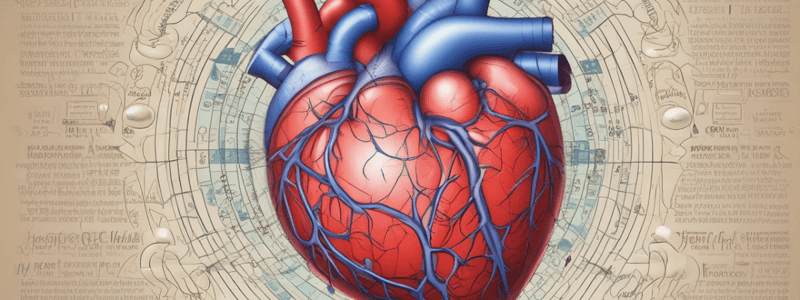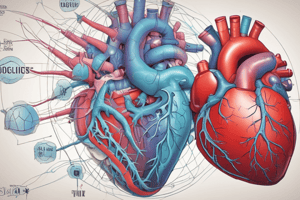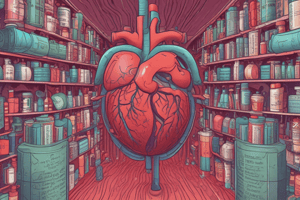Podcast
Questions and Answers
What is the effect of propranolol on the heart rate?
What is the effect of propranolol on the heart rate?
- Increases it
- Has no effect on it
- Decreases it (correct)
- Initially increases it then decreases it
Which of the following is NOT a use of propranolol?
Which of the following is NOT a use of propranolol?
- Angina
- Asthma (correct)
- Hypertension
- Arrhythmias
What is the mechanism of action of nitroglycerin?
What is the mechanism of action of nitroglycerin?
- It increases the contraction of the heart
- It dilates blood vessels (correct)
- It increases the clotting of blood
- It inhibits the contraction of the heart
What is the effect of digitalis on the heart?
What is the effect of digitalis on the heart?
What is the half-life of propranolol?
What is the half-life of propranolol?
What is the enzyme responsible for converting nitroglycerin to nitric oxide?
What is the enzyme responsible for converting nitroglycerin to nitric oxide?
What is the primary effect of digoxin on the heart muscles?
What is the primary effect of digoxin on the heart muscles?
What is the mechanism of action of digoxin in the heart?
What is the mechanism of action of digoxin in the heart?
What is the effect of digoxin on the pumping action of the ventricles in congestive cardiac failure?
What is the effect of digoxin on the pumping action of the ventricles in congestive cardiac failure?
What is the half-life of digoxin?
What is the half-life of digoxin?
What is the mechanism of action of aspirin as an antiplatelet agent?
What is the mechanism of action of aspirin as an antiplatelet agent?
Why does the effect of aspirin on platelets last for 7-10 days?
Why does the effect of aspirin on platelets last for 7-10 days?
What is the primary reason for using low-dose aspirin in preventing ischemic stroke and MI?
What is the primary reason for using low-dose aspirin in preventing ischemic stroke and MI?
Which of the following clotting factors is NOT inactivated by heparin?
Which of the following clotting factors is NOT inactivated by heparin?
What is the primary mechanism of action of warfarin?
What is the primary mechanism of action of warfarin?
What is the primary adverse effect of heparin that is associated with a high incidence of thrombosis and amputations?
What is the primary adverse effect of heparin that is associated with a high incidence of thrombosis and amputations?
What is the primary method of monitoring warfarin therapy?
What is the primary method of monitoring warfarin therapy?
What is the primary treatment for warfarin-induced skin necrosis?
What is the primary treatment for warfarin-induced skin necrosis?
Flashcards are hidden until you start studying
Study Notes
Propranolol and Heart Rate
- Propranolol is a beta-blocker that reduces heart rate by antagonizing beta-adrenergic receptors.
- Common uses include treating hypertension, anxiety, and migraines.
Uses of Propranolol
- Not typically used as a primary treatment for asthma due to potential bronchoconstriction effects.
Nitroglycerin Mechanism of Action
- Nitroglycerin works by converting to nitric oxide, leading to vasodilation of blood vessels and decreased myocardial oxygen demand.
Digitalis and Heart Function
- Digitalis positively inotropes the heart, increasing the force of ventricular contraction.
- It helps manage heart failure and arrhythmias by enhancing cardiac output.
Propranolol Half-Life
- The half-life of propranolol is approximately 3 to 6 hours.
Nitroglycerin Conversion Enzyme
- The enzyme responsible for converting nitroglycerin to nitric oxide is mitochondrial aldehyde dehydrogenase.
Digoxin Effects on Heart Muscle
- Digoxin enhances the contractility of heart muscle, supporting more effective pumping.
Mechanism of Action of Digoxin
- Digoxin inhibits the Na+/K+-ATPase pump, increasing intracellular sodium and calcium, which strengthens heart contractions.
Digoxin in Congestive Cardiac Failure
- In congestive heart failure, digoxin improves the pumping action of ventricles, reducing symptoms of fatigue and shortness of breath.
Digoxin Half-Life
- Digoxin has a half-life of about 36 to 48 hours, requiring careful monitoring for toxicity.
Aspirin as an Antiplatelet Agent
- Aspirin inhibits cyclooxygenase-1 (COX-1), preventing the formation of thromboxane A2, which is essential for platelet aggregation.
Duration of Aspirin's Antiplatelet Effect
- Aspirin’s effect on platelets lasts 7-10 days due to irreversible inhibition of COX-1 in platelets.
Low-Dose Aspirin Benefits
- Low-dose aspirin is used to prevent ischemic stroke and myocardial infarction (MI) by reducing clot formation.
Clotting Factors and Heparin
- Heparin does not inactivate factor VII, which is essential for the extrinsic coagulation pathway.
Warfarin Mechanism of Action
- Warfarin works by inhibiting vitamin K epoxide reductase, affecting the synthesis of vitamin K-dependent clotting factors.
Heparin Adverse Effects
- Heparin can induce thrombocytopenia, leading to a paradoxical increased risk of thrombosis and potential amputations.
Monitoring Warfarin Therapy
- Prothrombin time (PT) and INR (International Normalized Ratio) are used as standard measures for monitoring warfarin therapy.
Warfarin-Induced Skin Necrosis Treatment
- The primary treatment for warfarin-induced skin necrosis includes discontinuing warfarin and administering vitamin K.
Studying That Suits You
Use AI to generate personalized quizzes and flashcards to suit your learning preferences.




